No Echo Read online
Page 8
The only woman he had never actually abandoned was his mother. Each time their relationship ran into difficulties, he simply lay low for a while. Then it was smoothed over. Billy T. had never understood the expression “to work at a relationship.” A relationship was not a job. Either you saw eye-to-eye, or else you didn’t.
The encounter with Suzanne had been just what he didn’t need.
When he had sprinted home from Entré on Monday night, he had wanted to cry. Instead he had blamed the toothache and had gone to bed before Tone-Marit. He had lain awake that night too.
It must have been twenty years since he had last seen Suzanne.
He got up carefully, dragging his quilt with him.
The boys’ beds were too small.
He lay down on the settee. Truls had broken his earphones last weekend, when the youngsters had agitated to play Star Wars and Truls was made to be Princess Leia because he was the youngest.
Eighteen years had gone by since he had heard from her, when he made a precise calculation. He did not want to; he wanted to think about something else.
He had been twenty-two then, and his first year at police college was almost over. She had phoned him to help her return to the acute psychiatric wing. After that she had simply disappeared. As far as he was aware, she had later moved to France. It was of no concern to him and he had forgotten all about her.
Alexander wanted nothing but a PlayStation. He was the only boy in his class who did not have one. A PlayStation cost as much as what Billy T. had to spend on all four boys added together.
He closed his eyes and pressed his jaw shut to ease the toothache. It grew worse. Now the pain was gripping the back of his head tight; it felt as if half his head was being unscrewed from his body.
Hanne Wilhelmsen had left him.
She was the one who had left him, not the other way around.
He did not want to think.
The phone rang.
Billy T. jumped up, dashed into the hallway, and threw himself at the apparatus before it had time to ring again. He stood stiffly to attention and listened for sounds from the bedroom.
“Hello,” he almost hissed into the receiver.
“Hi. It’s Severin.”
“It’s … it’s nearly one o’clock, for fuck’s sake!”
“Sorry, but—”
“I’ve a wee baby here, you know!”
“I’ve said sorry, but there’s something I was sure you’d want to know right away.”
“What’s that, then?”
Billy T. pushed his thumb into his eye socket and pressed hard.
“Brede Ziegler was murdered twice.”
Car tires screeched outside the window, followed by the noise of a violent collision. Billy T. held his breath and sent up a silent prayer.
Jenny wailed.
“Shit,” he said. “The baby’s awake. What did you say?”
He moved to the window and looked out. A taxi driver was arguing with a young woman who was in floods of tears. Two Mercedes had taken an enormous mouthful from each other’s front end.
Jenny was screeching like a stuck pig.
“Wait a minute,” Billy barked into the phone.
Tone-Marit was about to lift the baby when he entered the bedroom. Half-asleep, she handed him the child without protest, before quite literally diving back into bed.
“Hush, my little one. It’s Daddy. Nothing’s wrong.”
Clamping his daughter to his chest, he tottered back to the living room to pick up the receiver again.
“What did you say?” he mumbled.
“Brede Ziegler was in fact killed twice.”
Jenny gurgled and grabbed her father’s nose.
“Twice,” he said in a monotone. “He was killed twice. Well, well.”
“Do you remember Forensics wondering whether the guy was a drinker? Because his complexion was such a strange color?”
“I think so.”
As the sound of howling sirens approached, Jenny clung to his neck. She began to cry again. Billy T. pushed a pacifier into her gaping mouth.
“It wasn’t alcohol. It was paracetamol. Brede Ziegler was poisoned. Stuffed full of paracetamol.”
“Paracetamol? You mean … like ordinary Paracet, the kind in the orange wrapper?”
“Extremely dangerous in large doses. That’s why you can’t buy more than one pack at a time in the pharmacy.”
“But … did he die of that? Was he already dead when he was stabbed?”
“No, the other way round. He died of the knife wound, but would probably have died later of poisoning anyway. If he hadn’t received hospital treatment, that is. In time.”
“Oh, fuck.”
“You can say that again.”
“We’ll discuss this in the morning.”
“Fine. Hope I haven’t spoiled the night for you.”
“Spoiled nights are my specialty,” Billy T. murmured as he dropped the receiver on the floor.
When the vehicles outside had been towed away and Jenny had fallen asleep at last, it was past five o’clock on the morning of Thursday December 9. Billy T. laid the child down in bed and padded out to the bathroom. He ran the bath water and decided to go to work as soon as he was dressed. It was all the same to him. If he fell asleep now, he would never be able to get up again. As the bath filled, he pressed the nine remaining Paracet tablets out of their foil and flushed them down the toilet, where they vanished in a rush of blue water.
At least his toothache had gone.
14
One of the many snippets of information Vilde Veierland Ziegler had withheld from the police was that she mainly stayed at Sinsen, where she had a two-room apartment in Siloveien. The second room, strictly speaking, was no more than a hole in the wall with space for a broad single bed. The apartment did contain a toilet, but the shower was in the hallway and shared by three apartments.
Brede sometimes needed peace and quiet – that’s what he had said, at least. After all, he was an artist. In the beginning the arrangement had seemed prudent. He simply asked now and again to be allowed some space, every second week or so. Just for a couple of days. Later it grew longer. For the past three months she had noticed that, without really thinking it through, she had moved all her clothes and personal possessions into the poky apartment. That was where she lived. She still kept the key and code for Niels Juels gate, but she had hardly spent a night there for several weeks.
Vilde had no idea who owned the apartment in which she was living. Brede had taken care of it all. It had not meant anything, and he always arranged everything. Now things had become more difficult. She sat curled up in bed with her knees tucked under her chin, completely in the dark as to who was the owner of her home. The police would almost certainly find out where she really stayed. Maybe she ought to move down to Niels Juels gate at once. She had already considered that when she had left police headquarters, but something held her back. Niels Juels gate was more like an exhibition space. Brede had been so hysterically terrified that she might make any change whatsoever to the interior decor. She had felt as though even her wardrobe was a hindrance to what Brede liked to call “an overall manifestation of aesthetics.”
Vilde felt more at ease in Sinsen.
When she inherited Niels Juels gate, she would sell the vast apartment. She would buy herself a little house, maybe in a terrace, in Asker or Bærum, with a small garden and money to spare. She would study. Do some traveling. Quite a lot, when she came to think of it. Traveling was the best way to learn languages.
Vilde burst into tears, clutching her own knees as she rocked back and forth. Brede was dead. The policewoman had been nice enough, but it seemed exactly as if she had seen right through her. She had spotted the concealments lodged inside her throat and made her start to tell lies. They had taken a break three times, and each time Vilde had been offered coffee and bread rolls. She didn’t succeed in swallowing a single morsel.
The noise of the doorbell ring
ing made her bump her knees on her chin. She bit her cheek and was immediately aware of the taste of blood. The digital alarm told her that Thursday had barely begun; it was twenty minutes to six. She remained seated, completely motionless. Someone must have pressed the wrong button; it happened quite often. It rang again.
She would not open the door.
If she sat quite still and pretended not to be at home, then whoever was trying to get hold of her would disappear.
Someone pressed a finger on the doorbell and refused to let go. The shrill sound reverberated through her apartment for a long time. Vilde closed her eyes, holding her hands over her ears.
After a couple of minutes she struggled to her feet and crossed to the window. Slowly, taking care not to be seen, she peered out between the window ledge and the drawn curtains. A male figure, obviously drunk, staggered away along the path. When he reached the bench at the roadside, he leaned against it and turned to face the apartment block. Quick as a flash, Vilde pulled back. She had recognized the man’s jacket. Not at all strange, since she had given it to him as a present less than two years earlier, when they had been madly in love and planning to marry.
15
She just wanted to turn back. Momentarily she regretted not wearing the jacket with big lapels that she could have turned up, or maybe a hat. Something to hide behind.
Grønlandsleiret 44 was exactly as before. In one or two windows an optimistic officer who still believed in Christmas had lit a candle to create something of an Advent atmosphere. Apart from that, everything was gray, the way it had always been. The slope up to the main entrance of police headquarters was just as grueling as ever, and she buttoned her jacket as she walked. She stopped at the massive familiar steel doors. She could still turn tail, but she knew that would only be a postponement of the inevitable. Taking a deep breath, she pushed against the door and stepped into the foyer.
The smell made her gasp.
Hanne Wilhelmsen had never thought about police headquarters having a smell, an almost imperceptible scent of office building and sweat, of fear and arrogance, papers, metal, and floor polish. It reeked of the police, and she crossed to the elevator.
“Hanne? Hanne, is it you?”
Erik Henriksen’s shock of red hair was as untidy as ever, and his mouth fell open.
“The one and only.”
Hanne really made an effort to smile. She felt her leather jacket sticking to the back of her shirt, and most of all wanted to do an about-turn and vanish.
“Where have you …? Where have you been? Are you back … for good, I mean? How are you doing?”
The elevator pinged. Hanne snaked past her former colleague, sending up a silent prayer that the doors would close before it entered his head to follow.
“Speak later,” she mumbled, and her prayer was answered.
It seemed as though the rumor had traveled faster than the elevator. On the sixth floor, she had the impression that everyone was staring at her. At the canteen entrance, five people stood silent, but made no move to go inside for lunch. She nodded half-heartedly at one of them as she passed. Their eyes burned into her back as she continued along the gallery toward the Chief of Police’s office. The faint whispering rose to animated discussion as she moved off.
In the end she could not restrain herself.
She wheeled round and suddenly the five officers rushed away.
When her gaze swept down over the galleries on the other side of the six-story foyer, she caught sight of him. On the second floor, blue zone. Stopping suddenly, he leaned against the banister and squinted up at her. He was too far away for her to read the expression on his face.
All the same, it was impossible to mistake.
Billy T. shrugged and turned his back on her.
As for herself, she called in to see the Chief of Police, to find out whether she still had a job.
16
“I thought the woman was mentally disturbed, so I did. At least, that’s what I’d heard. Admitted to Gaustad psychiatric hospital and that sort of thing. Committed, or so they say.”
Beate from reception adjusted her dress strap with a giggle, before taking a far too generous swig of the aquavit. A fine shower of alcohol sprayed across the table, and Karianne swiftly drew back.
“Somebody said she had gone to China to adopt a child. Somebody who knows her really well, that is. So I’d thought she might be on some sort of maternity leave, or whatever they call it these days …”
Karianne Holbeck’s appearance had undergone a transformation that caused a couple of police trainees to force their way down to their table. Normally she hung about in clothes from the Lindex fashion chain, which revealed no secrets other than that she was heavily built. She never wore make-up. Her face was usually pale, with almost-white eyelashes and brows. Her annoying tendency to blush was afforded plenty of leeway. Her colleagues had begun to give her the nickname “Traffic Light” when they thought themselves out of earshot.
She was unrecognizable. A well-fitting dress of gray velvet skimmed over rounded hips and thighs. Her ample breasts had uplift. Her hair usually hung loose, presumably because it was the only cover she could hide behind when her face turned red. Now she had clearly paid a visit to the hairdresser, since the ingenious hairstyle could not possibly be her own handiwork. Or the make-up, either: it looked as if she had just taken part in some gala TV show.
“I think I’m overdressed,” she whispered to Severin Heger, tightly clutching her beer glass. “Look at them all!”
He sat beside her with his arm around her bare shoulders. Karl Sommarøy stood at the bar counter discussing cars with a colleague. He had just bought a four-year-old Audi A6 and was complaining that the turbo was smoking after only two days. His shirt tail was hanging out and he was dressed in jeans. Admittedly he was wearing a tie for once, but it was already loosened and would almost certainly end up adorning his head within the hour.
“You look fabulous,” Severin whispered in her ear. “The most beautiful woman here. The others are making fools of themselves. Not you. You are … stunning! Cheers.”
Her complexion was approaching purple as her fingers squeezed the glass even more tightly.
“This place is different from how I … from what I expected, you see.”
She stammered as she stole a glance around the room with her head bowed.
“Not exactly the Ritz, no. Hoi! You, Karl!”
Sommarøy turned around, showing his irritation.
“Don’t you have anything else to wear?”
“Just give over, won’t you! I thought we were going for a pizza!”
The run-down restaurant in Brugata was located only four or five siren-blasts away from police headquarters. The Christmas Party Committee had chosen the place from sheer laziness. Brown tables, red checked tablecloths, and candles planted in old Mateus Rosé bottles were in all likelihood intended to give the illusion of a French bistro.
Karl Sommarøy stuck his pipe in his mouth and plumped himself down at the table.
“As to food, what do you think?”
No one felt called upon to pass any remark about the black charred sheep heads, mostly untouched when they had been carried back to the kitchen nearly half an hour ago.
“But didn’t you see Hanne Wilhelmsen today, then?”
Beate from reception had begun to slur her words.
“I saw her, so I did!”
Billy T. sat sulking at the far end of the table. He had hardly spoken a word since his arrival, halfway through their meal. He did not have much to drink and looked at his watch every ten minutes. Now he leaned back and folded his arms across his chest.
Sergeant Klaus Veierød laughed all of a sudden.
“I’ve heard she’s writing a crime novel! Isn’t that what most folk do nowadays, eh?”
Veierød was probably the most experienced investigator of them all, having served in every single department in police headquarters. Three years ago he had been transferred
from Finance to Violent Crime. He was thorough, punctilious, and completely lacking in imagination. A long time had elapsed since he had realized he would never become a chief inspector, but that did not matter. He could retire on full pension in six years’ time, if he wanted to. Then he would be able to devote all his time to his collection of old war mementos. He was gradually beginning to form a plan of building a little museum in the ancient barn beside his cottage so that he could be his own boss, with no interference from anyone.
The breathless pace of the Violent Crime Section did not suit Klaus Veierød. Least of all did he like the inner circle that surrounded Hanne Wilhelmsen, Billy T., and Håkon Sand. When the clique had been disbanded – first by Sand being appointed a public prosecutor, and later by Hanne Wilhelmsen disappearing once the case involving the homicide charge against Chief Public Prosecutor Halvorsrud had been finally solved – Klaus Veierød had been only too pleased. Admittedly he had never questioned Wilhelmsen’s abilities. Privately he considered her the best detective the Oslo police force had ever seen. It was the feeling of being excluded that he could not stand. As long as Billy T. and Hanne Wilhelmsen were only sergeants, things had gone fairly smoothly. As chief inspectors, however, they were both useless. Skulking about here and there, whispering and harboring all sorts of secrets. That’s not how things were supposed to be.
“Billy T.,” Klaus Veierød said, leaning across the table. “Can’t you tell us where she’s been, eh? After all, you know her so well!”
The Chief Inspector looked at his watch again, before staring absent-mindedly into his glass, half-full of flat beer.
“Do you know,” Silje Sørensen said, installing herself on the lap of one of the police trainees, “I think we’ll soon be able to wrap up the whole investigation. It’s my belief that Brede Ziegler committed suicide.”
An awkward silence spread around the table where eight people now sat on six chairs.
“Exactly,” Severin murmured.
“Right enough,” Karl Sommarøy said, sucking his pipe.
“But think about it,” Silje insisted. “He was, after all, full of—”

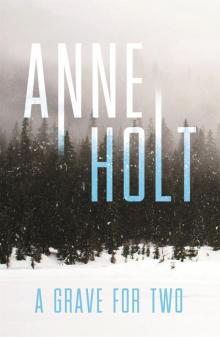 A Grave for Two
A Grave for Two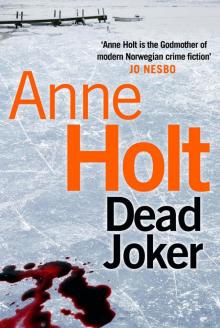 Dead Joker
Dead Joker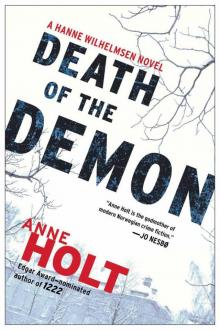 Death of the Demon: A Hanne Wilhelmsen Novel
Death of the Demon: A Hanne Wilhelmsen Novel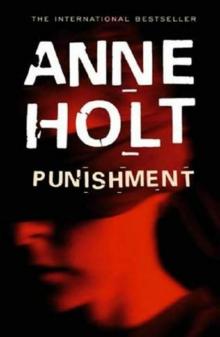 Punishment aka What Is Mine
Punishment aka What Is Mine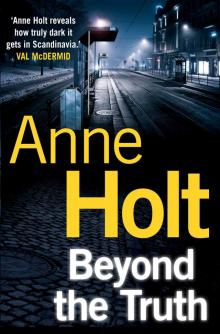 Beyond the Truth
Beyond the Truth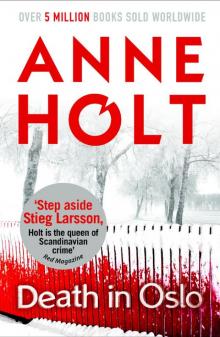 Death in Oslo
Death in Oslo The Blind Goddess
The Blind Goddess What Never Happens
What Never Happens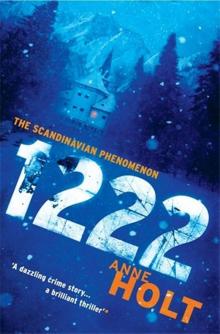 1222
1222 In Dust and Ashes
In Dust and Ashes Odd Numbers
Odd Numbers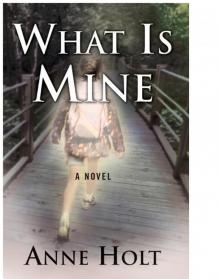 What is Mine
What is Mine What Dark Clouds Hide
What Dark Clouds Hide Blessed Are Those Who Thirst
Blessed Are Those Who Thirst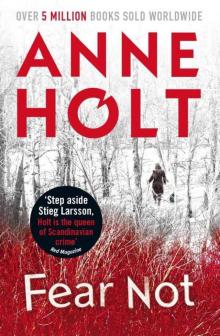 Fear Not
Fear Not No Echo
No Echo Hanne Wilhelmsen - 01 - The Blind Goddess
Hanne Wilhelmsen - 01 - The Blind Goddess